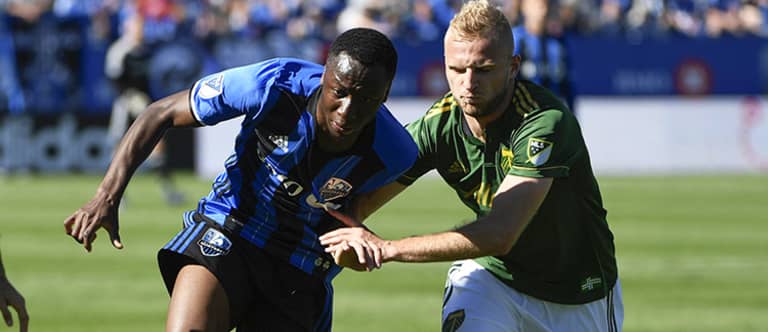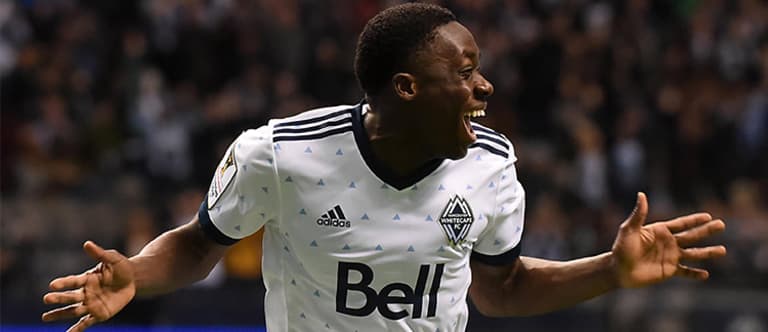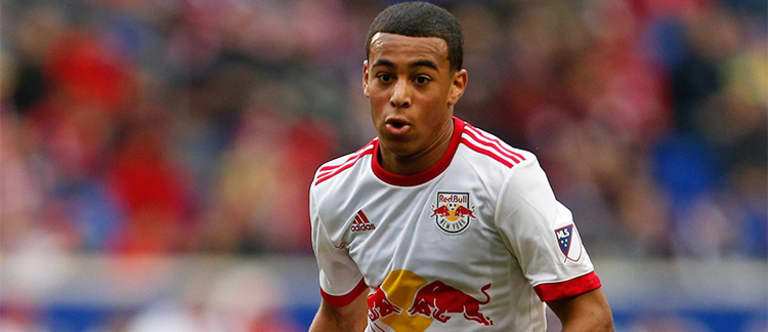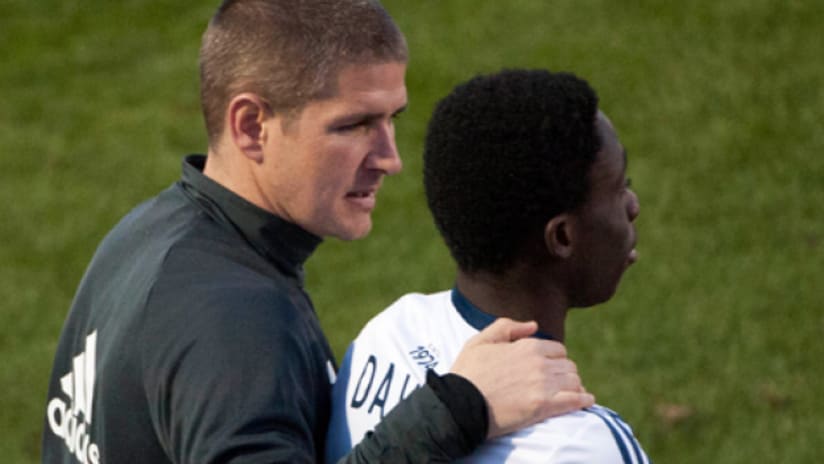In the early days of MLS young talents with national team promise were celebrated as the next coming. Youth national team stars like Freddy Adu and Landon Donovan earned lucrative sponsorship deals while they were still teenagers, and the media spotlight shone on them early and often—in Adu’s case, even before he had played a professional game.
But things are a lot different these days when it comes to young players who show a glimmer of star quality.

Take Ballou Jean-Yves Tabla, for example (pictured above). The 18-year-old, who was born in the Ivory Coast but grew up in Montreal, is already staking his claim as a starter with the Montreal Impact in MLS, causing defenders all sorts of problems with his speed and dribbling.
But while opposing teams send players to double-team Tabla on the field, head coach Mauro Biello is surrounding him with veteran players ready to give him advice about how to improve off it. And as Tabla continues to make headlines for brilliant displays, he will only speak to the media about once every two weeks as the Impact ensure they are careful and deliberate with his development.
“There are different pressures,” Biello said. “There’s a lot of pressure here for a young player and this is the first time that he’s facing pressures like that and so we need to shelter him from those types of pressures and in the end it will be up to him to learn and grow through experience. Eventually it will help him in his career.”
Laying down the law

Vancouver Whitecaps’ coach Carl Robinson takes a similar protective stance with his young players, especially when it comes to Alphonso Davies (above). A dynamic winger, the 16-year-old already has three goals in cup competitions. To keep him hungry and prevent any emotional wear, Robinson likes to rotate him in and out of matches.
Off the field, he reminds Davies that he “doesn’t want any nonsense.” He’s encouraged to spend time with his friends, but it’s not without a curfew. If he wants to play for the senior team, there’s a diet he needs to follow and school homework to complete.
Robinson acknowledges the importance of media exposure, but he also sees its dangers and has put restrictions in place. The Whitecaps receive interview requests almost every day for Davies, but, like Tabla, he speaks just once every two weeks.
“The media are great but they do like to build players up to knock them down,” Robinson said. “And for players that have never been in that situation, who are unable to know what it means, what it takes, and deal with it, it’s very hard. So that’s why I try and protect the boy.”
Though MLS clubs are obliged to make their players available to the media, there is leeway as to the frequency; and when it comes to developing a young player, opinions differ about how much media exposure is a good thing.
A question of maturity

The New York Red Bulls are one club that’s chosen to make youth development a major part of their identity. So much so that senior players need to be willing to help with that process: to groom younger players that will eventually take their jobs.
“Or else we can’t have them here,” says coach Jesse Marsch.
But Marsch doesn’t have the same reservations as his colleagues in Montreal and Vancouver about young players being in the public eye.
“The simple answer is that we don’t worry about the media,” Marsch said. “I think that that’s part of the learning process for these players. And what’s key in general is to obviously put them in positions to succeed, but not in a way that protects them from pitfalls of being a professional.”
In the case of 18-year-old Tyler Adams, the Red Bulls’ most promising young player, who is starring for the US Under-20 national team at the FIFA U-20 World Cup, he's needed very little input from the coaching staff with respect to off-the-field matters, according to Marsch. Things were a bit different when former RBNY defender Matt Miazga came into the first team. Marsch says he spent a lot of time working with Miazga on “becoming a man.” Those efforts paid off as the center back, then just 19, became a regular starter and then a full US international before transferring to Engish club Chelsea in 2016.
Adams has impressed Red Bulls communications staffers with his measured responses to the media, and Marsch considers the midfielder to be one of the most mature players on his roster. After replacing the weighty shoes of veteran Dax McCarty, who was traded earlier this season to Chicago, Adams already has seven starts under his belt, and he's still a few weeks away from finishing high school.
Different times
Marsch argues that the new crop of players in North America are a lot more prepared for professional soccer than they were in his own playing days, since they can now grow up watching soccer and consuming soccer media to a much greater extent than he was.
“Tyler Adams doesn’t know a world that doesn’t have MLS,” Marsch said. “He grew up watching MLS. He grew up following the media and he grew up understanding what that was going to be like. So they’re much more in tune with what that requires. If you were going to take my generation of guys, we didn’t get to see professionals very much. We didn’t get to see soccer on TV as much, we didn’t get to see interviews. Our concept of what that was was very different.”
As prepared and precocious as they might be, when it comes to young players and the limelight, Robinson, a former midfielder in the English Premier League, leans toward a cautious approach. In fact, in some cases, Robinson would prefer if reporters “stay away from them.”
“Freddy [Adu] is a perfect example here in North America of what happens every other week in England with new talents,” Robinson said. “They get given things too soon, and they don’t fill their potential. We all have a place to play in that.”














